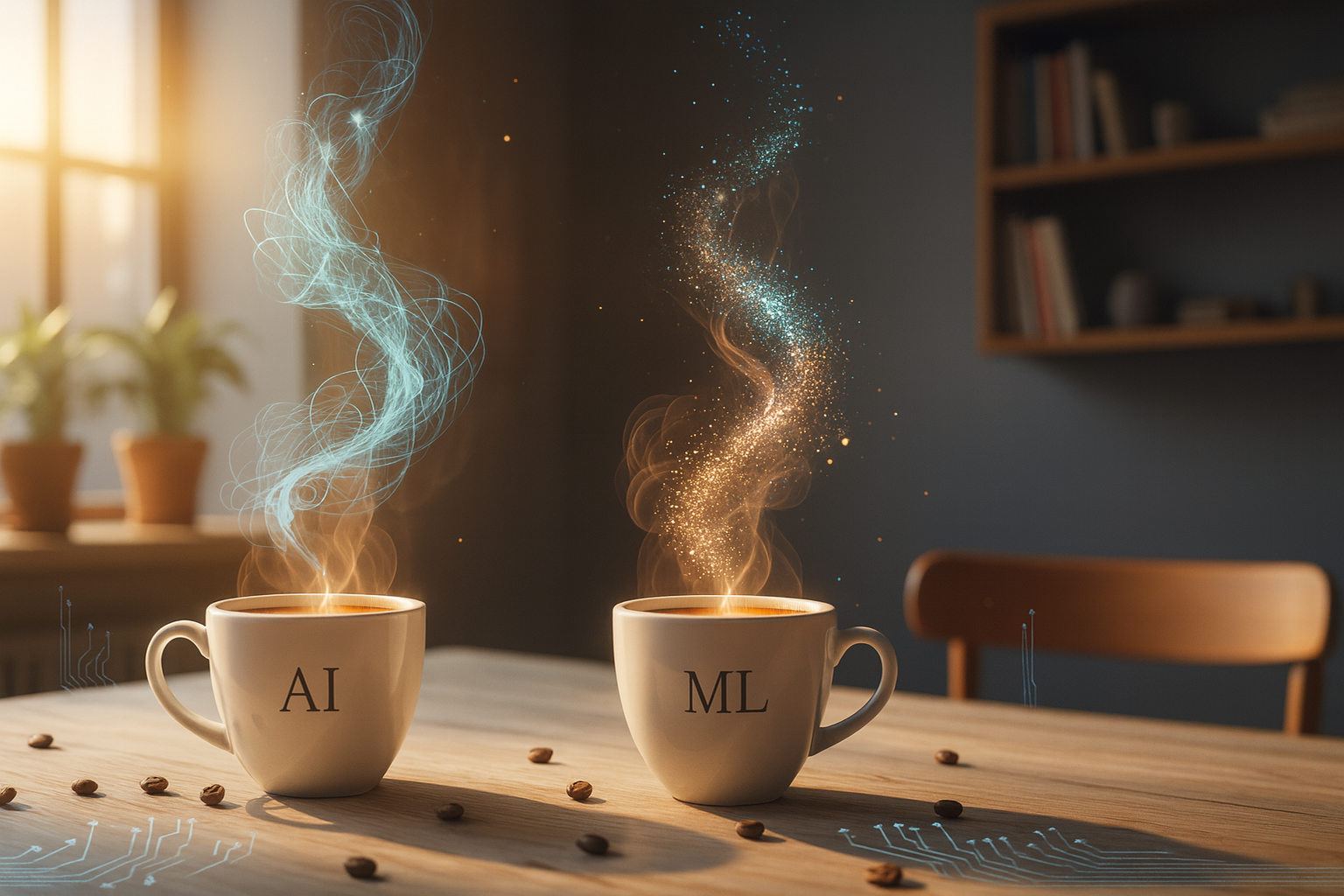
AI vs ML: The Coffee Shop Explanation That Actually Makes Sense
I was grabbing coffee last week when my friend asked me to explain the difference between AI and Machine Learning. I started rambling about algorithms and data processing, and I watched her eyes glaze over in real time.
So I tried something different. I pointed at the coffee shop around us and said, "See this place? This is exactly how AI and Machine Learning work together."
The Confusion Everyone Has
Here's the thing. People use "AI" and "Machine Learning" like they're the same thing. Tech companies do it. News articles do it. Even people who work in tech do it.
But they're not the same. And understanding the difference isn't just semantic nitpicking. It actually helps you understand what's happening when someone says "this app uses AI" or "we're implementing machine learning."
The problem is that most explanations get too technical too fast. They start throwing around terms like "subset" and "neural networks" before you've even understood the basic concept.
The Coffee Shop Analogy
Think of it this way: AI is the entire coffee shop. It's the whole experience, the complete establishment that serves you coffee.
Machine Learning? That's just the brewing method. It's one specific way the coffee shop makes your drink, but it's not the only way.
The coffee shop has lots of ways to operate. It has a cash register that follows programmed rules for calculating your total. It has a timer that beeps when your sandwich is ready. It has a system for tracking inventory.
Some of these systems are simple and rule-based. You order a large coffee, the register adds $3.50. That's basic programming, not Machine Learning.
But then there's the recommendation system that suggests drinks based on what you've ordered before. That's Machine Learning. It learned your preferences by watching patterns in your order history.
Breaking It Down
Artificial Intelligence is any technology that makes machines act intelligently. That's it. If a computer does something that seems smart or human-like, that's AI.
This includes simple stuff like a chess program that follows predetermined rules. That's AI, even though it doesn't learn anything new. It's just really good at following complex instructions.
Machine Learning is a specific type of AI that learns from experience. Instead of being programmed with explicit rules, it finds patterns in data and gets better over time.
Think about the difference between these two coffee shop scenarios:
Scenario 1: The barista follows a recipe card exactly. Two shots of espresso, steam milk to 160 degrees, pour. Same every time. That's traditional AI - smart, capable, but following predetermined rules.
Scenario 2: The barista notices you always ask for extra foam, so after a few visits, she starts making it that way automatically. She learned your preference. That's Machine Learning.
Why This Matters
Understanding this difference helps you make sense of the technology around you.
When your email filters spam, that's Machine Learning. It learned what spam looks like by seeing millions of examples.
When your GPS calculates the fastest route, that's traditional AI. It's following programmed rules about distance and speed limits, not learning from experience.
When Netflix recommends shows, that's Machine Learning. When it plays the video you clicked on, that's just regular programming.
The coffee shop (AI) needs all these different systems working together. Some learn, some don't. But they're all part of creating the intelligent experience.
The Bottom Line
AI is the coffee shop. Machine Learning is the brewing method. Both are valuable, both are real, and both are making technology smarter.
You don't need to be a tech expert to understand this. You just need to remember that AI is the big umbrella, and Machine Learning is one specific approach that happens to be really popular right now.
Pour yourself a coffee and think about all the AI and Machine Learning systems you interact with every day. You'll start noticing them everywhere, and now you'll actually know what you're looking at.
See you next week. Bring your questions.